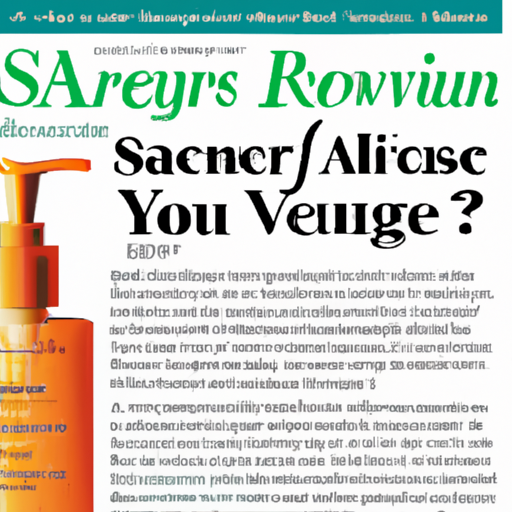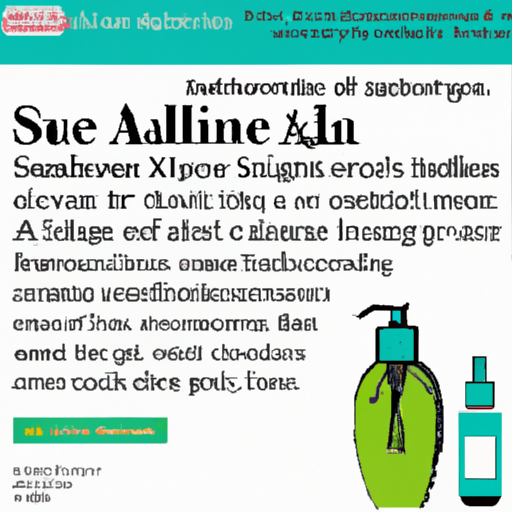
In this article, you will learn some helpful tips on how to effectively treat sunburn. We will discuss various methods and remedies that you can try at home to alleviate the discomfort and promote healing. By the end, you will have a better understanding of how to care for your sunburned skin and expedite the recovery process.
First and foremost, it is important to hydrate your body and your skin. Drink plenty of water to keep your body moisturized from the inside out. Additionally, apply a soothing moisturizer or aloe vera gel on your sunburned skin to provide relief and prevent excessive dryness. Secondly, taking a cool bath or applying cold compresses to the affected areas can help reduce inflammation and alleviate the burning sensation. Lastly, over-the-counter pain relievers such as ibuprofen or acetaminophen can be helpful in relieving pain and reducing inflammation. Remember, however, to always consult with a healthcare professional before taking any medications.
Causes of Sunburn
Sunburn is a common skin condition that occurs when the skin is exposed to excessive ultraviolet (UV) radiation from the sun or artificial sources such as tanning beds. There are several factors that can contribute to the development of sunburn.
Ultraviolet Radiation
UV radiation is a type of electromagnetic radiation emitted by the sun. It is classified into three types: UVA, UVB, and UVC. UVA rays are the least harmful but can still penetrate deep into the skin, causing premature aging and wrinkling. UVB rays are the main cause of sunburn and can also contribute to the development of skin cancer. UVC rays are the most dangerous but are almost entirely absorbed by the Earth’s atmosphere.
Exposure to Sun
The longer you are exposed to the sun’s rays, the higher the risk of sunburn. Sunburn can occur within minutes of sun exposure, especially during peak sunlight hours between 10 am and 4 pm. It is important to limit your time in the sun and seek shade when the sun’s rays are the strongest.
Skin Type
Different skin types have varying levels of melanin, which is the pigment responsible for giving color to the skin and providing some protection against the sun’s rays. People with fair or light skin are more prone to sunburn than those with darker skin tones. Additionally, certain medications and medical conditions can make the skin more sensitive to the sun.
Symptoms of Sunburn
Sunburn can cause a range of symptoms, which can vary in severity depending on the degree of sunburn.
Redness
One of the most noticeable symptoms of sunburn is redness of the affected skin. The skin may appear pink, red, or even blistered in severe cases. This redness is a result of the increased blood flow to the damaged area.
Pain and Tenderness
Sunburned skin can be painful and tender to the touch. The severity of the pain can range from mild discomfort to intense burning sensations.
Swelling
Inflammation of the affected skin can lead to swelling. Swelling may be accompanied by itching and a feeling of tightness in the skin.
Immediate Treatment
If you have sunburn, there are several immediate steps you can take to alleviate the symptoms and promote healing.
Move to Shade
As soon as you realize that you have been sunburned, it is important to move to a shady area to avoid further sun exposure. Staying in the sun can aggravate the burn and delay the healing process.
Cool Compress
Applying a cool compress to the affected area can help reduce inflammation and soothe the skin. You can use a clean cloth soaked in cool water or a cold pack wrapped in a thin towel. Avoid using ice directly on the skin as it can cause further damage.
Apply Aloe Vera Gel
Aloe vera gel is known for its soothing properties and can provide relief from sunburn. Apply a generous amount of pure aloe vera gel to the affected area and gently massage it into the skin. Repeat this process several times a day to keep the skin hydrated and promote healing.
Over-the-Counter Treatment Options
If the sunburn is more severe or the symptoms are not improving, over-the-counter treatments can help provide relief.
Hydrocortisone Cream
Hydrocortisone cream can help reduce inflammation and relieve itching caused by sunburn. Apply a thin layer of hydrocortisone cream to the affected area, following the instructions on the packaging. It is important to note that prolonged use of hydrocortisone cream can thin the skin, so use it sparingly and only as directed.
Topical Analgesics
Topical analgesics, such as creams or sprays containing lidocaine or benzocaine, can help numb the skin and alleviate pain associated with sunburn. These products should be used according to the instructions on the packaging.
Antibiotic Ointments
If the sunburned skin becomes blistered or develops open sores, applying an antibiotic ointment can help prevent infection. Clean the affected area gently with mild soap and water, pat it dry, and apply a thin layer of antibiotic ointment.
Home Remedies for Sunburn
In addition to over-the-counter treatments, there are several home remedies that can help alleviate the symptoms of sunburn.
Cool Milk Compress
Soaking a clean cloth in cool milk and applying it to the affected area can help draw out the heat and reduce inflammation. The proteins and fats in milk provide a soothing effect on the skin.
Oatmeal Bath
Taking a cool bath with colloidal oatmeal can help relieve itching and inflammation caused by sunburn. Colloidal oatmeal can be found in pharmacies or can be made by grinding regular oatmeal into a fine powder. Add the oatmeal to the bathwater and soak for 15 to 20 minutes.
Vinegar Rinse
Mixing equal parts of apple cider vinegar and cool water and applying it to the sunburned skin can help balance the skin’s pH levels and reduce inflammation. After applying the vinegar rinse, gently pat the skin dry.
Preventing Sunburn
Preventing sunburn is the best way to avoid the discomfort and long-term consequences associated with it.
Use Sunscreen
Apply a broad-spectrum sunscreen with a sun protection factor (SPF) of at least 30 to all exposed areas of the skin, including the face, neck, arms, and legs. Remember to reapply every 2 hours or after swimming or sweating.
Wear Protective Clothing
Wearing lightweight, long-sleeved clothing and pants made of tightly woven fabric can provide added protection against the sun’s harmful rays. Don’t forget to wear a wide-brimmed hat and sunglasses to shield your face and eyes.
Avoid Peak Sun Hours
Try to avoid being in direct sunlight during the peak hours of 10 am to 4 pm when the sun’s rays are the strongest. If you must be outside, seek shade whenever possible and take breaks in cool, shaded areas.
Sunburn Dos and Don’ts
When dealing with sunburn, there are certain things you should and shouldn’t do to promote healing and avoid further damage.
Do Drink Plenty of Water
Sunburn can dehydrate the body, so it is important to drink plenty of water to replenish lost moisture. Staying hydrated can also help the skin heal faster.
Don’t Pop Blisters
If your sunburned skin develops blisters, it is important not to pop them. Popping blisters can increase the risk of infection and delay the healing process. Instead, allow the blisters to heal on their own.
Do Seek Medical Attention if Severe
If you experience severe symptoms such as high fever, severe pain, or widespread blistering, it is important to seek medical attention. Additionally, if you have underlying health conditions or are taking medications that may worsen sunburn, consult with a healthcare professional.
Sunburn and Skin Cancer
Sunburn not only causes immediate pain and discomfort but can also increase the risk of developing skin cancer in the long run.
Increased Risk
Repeated sunburns can damage the DNA in skin cells and increase the risk of developing skin cancer, such as melanoma, basal cell carcinoma, and squamous cell carcinoma. It is crucial to protect your skin from the sun’s harmful rays to reduce this risk.
Importance of Sunscreen
Regularly applying sunscreen can help prevent sunburn and protect against skin cancer. Look for broad-spectrum sunscreens that provide protection against UVA and UVB rays and have an SPF of at least 30. Make sunscreen a part of your everyday routine, even on cloudy days.
Regular Skin Checks
Performing regular self-examinations of your skin can help detect any changes or abnormalities early on. Be on the lookout for new moles, changes in the size, shape, or color of existing moles, and any sores that do not heal within a few weeks. Consult a dermatologist if you notice any suspicious changes.

Children and Sunburn
Children are particularly vulnerable to sunburn and require extra care and precautions.
Higher Risk
Children have delicate and sensitive skin that is more susceptible to sunburn. Their skin is also more sensitive to chemicals found in some sunscreens. It is essential to take extra precautions when protecting children from the sun.
Use Sunscreen Specifically for Children
Choose a sunscreen that is specifically formulated for children, as these are usually gentler and less likely to cause skin irritation. Apply sunscreen to all exposed areas of your child’s skin and reapply regularly, especially if they are swimming or sweating.
Keep Infants Out of Direct Sunlight
Babies under six months old should be kept out of direct sunlight altogether, as their skin is highly sensitive and not yet able to produce enough melanin for protection. Seek shade or use a stroller shade or umbrella to shield them from the sun.
Conclusion
Proper care and prevention are essential for treating and avoiding sunburn effectively. By taking simple precautions, such as using sunscreen, wearing protective clothing, and avoiding peak sun hours, you can protect your skin from harmful UV radiation. Remember to stay hydrated, seek shade when needed, and apply soothing remedies like aloe vera gel. Regular skin checks and early detection of any changes can help minimize the risk of skin cancer. Take care of your skin, enjoy the sun responsibly, and maintain good skin health for years to come.



